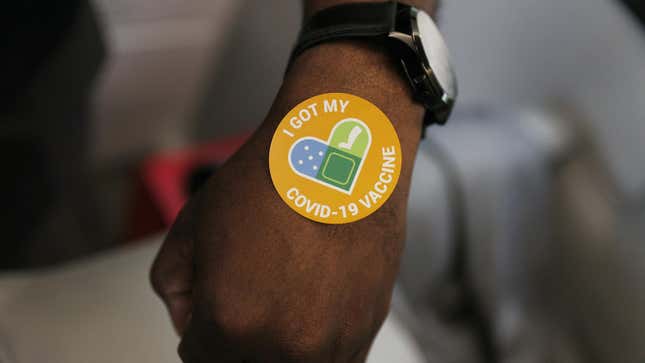
People who experienced a rare allergic reaction to the mRNA covid-19 vaccines may have less to worry about than feared, new research out Monday suggests. The study, which included several U.S. medical institutions, found that people who reported a reaction following their first dose were all able to safely take the second shot, with one in five experiencing only mild, manageable allergic symptoms after dose two.
Soon after the emergency use authorization of the Pfizer/BioNTech and Moderna vaccines last December, reports of people coming down with allergic reactions to the shot emerged. In some cases, these reactions were severe enough to need immediate medical treatment, which is known as anaphylaxis. These more severe reactions are thought to be very rare. A study of health care workers published this March, for instance, found that about 2% of people experienced any acute allergic reaction after their first shot, while only 0.025% developed anaphylaxis.
Still, the cases led to warning labels about the risk of allergy being added to both vaccines, particularly for people with past documented allergy to any vaccine ingredients. Federal guidance from the Centers for Disease Control and Prevention also began recommending a standard waiting period of 15 minutes for most people post-vaccination, since that’s when symptoms are most likely to appear, and 30 minutes for anyone at higher risk for allergy. The CDC additionally recommended that people who took the first dose and experienced anaphylaxis not take the second dose, but that they could still take the Johnson & Johnson single-dose vaccine instead.
This new study, though, published in JAMA Internal Medicine on Monday, indicates that this caution may need to be reevaluated. The researchers are affiliated with several medical centers in the country, including Massachusetts General Hospital and Brigham and Women’s Hospital, both in Boston, the Vanderbilt University Medical Center in Nashville, Tennessee, the Yale School of Medicine in Connecticut, and the University of Texas Southwestern Medical Center. They studied 189 people who visited these centers and who had documented symptoms of an allergic reaction to the first dose of either mRNA vaccine. Of these, 159 patients decided to get a second dose of the vaccine, including 17 people who had previously experienced anaphylaxis. Their outcomes the second time around were recorded either by medical staff at the time or through a follow-up phone call with the patients.
All of the people tolerated the second shot with no or minor issues, the researchers found. Twenty percent did report immediate symptoms of a possible allergic reaction post-dose; these included dizziness, sweating, or hives. But none reported symptoms that were worse than the first time, including anaphylaxis, and all of the cases were short-lasting, went away on their own, or were treatable with antihistamines alone.
“Our take home message is that immediate allergic symptoms after mRNA vaccines from Pfizer or Moderna do not preclude their future use. We were able to oversee the safe complete vaccination of 159 individuals who had reactions with their first mRNA dose,” study author Kimberly Blumenthal, an allergist/immunologist and drug allergy researcher at Massachusetts General Hospital, told Gizmodo via email.
Interestingly enough, the lack of a reaction from most people the second time around suggests a more complicated picture of what happened to them in the first place.
“It suggests that rather than due to classic allergy, mediated by IgE (immunoglobulin E) antibodies, where subsequent exposure to an allergen reproduces similar or more potent reactions, like food allergy, some of the observed immediate reactions to mRNA COVID-19 vaccines may be due to other mechanisms that are not recurrent and can be reduced with premedication, such as antihistamines,” Blumenthal said (Notably, 30% of patients took antihistamines just before their second shot).“A good example similar to what we observed may be intravenous contrast agents where immediate reactions—even anaphylaxis—can often be prevented with premedication such as antihistamines and corticosteroids.”
As with any study, this research has limitations. The study was retrospective, meaning it relies on data collected in the past (prospective studies track people in real time, which usually allows for clearer interpretation of the results). Different medical centers may also have used different criteria for measuring symptoms. And people in the study were referred to these centers for their initial allergic reaction, which could make them different in important ways to the larger population of people with a possible vaccine allergy.
Still, the researchers say their findings should make people start to reconsider the untested strategy of mixing the first dose of a mRNA vaccine with the J&J vaccine the second time rather than simply giving them both doses, at least on the justification of keeping people safe from further dangerous reactions.
“Complete two dose vaccination has become even more important with the delta variant and we suspect there are many more people who did not get their second shot because of allergic symptoms,” Blumenthal said.
It’s likely that further studies will be needed to actually convince agencies like the CDC to reconsider their stance on shots for these allergic people. But more relevant research should be on the way soon enough. In April, the federal government announced it would study people with certain allergic conditions, such as mast cell disorders, and compare what happens to them after taking a mRNA vaccine to a control group.
As for people worried about their own risk following an allergic reaction to the first dose, Blumenthal advises that people talk with their doctor and consider the input of an allergist when weighing the risks and benefits of a second dose.
This article has been updated with comments from one of the study’s authors.